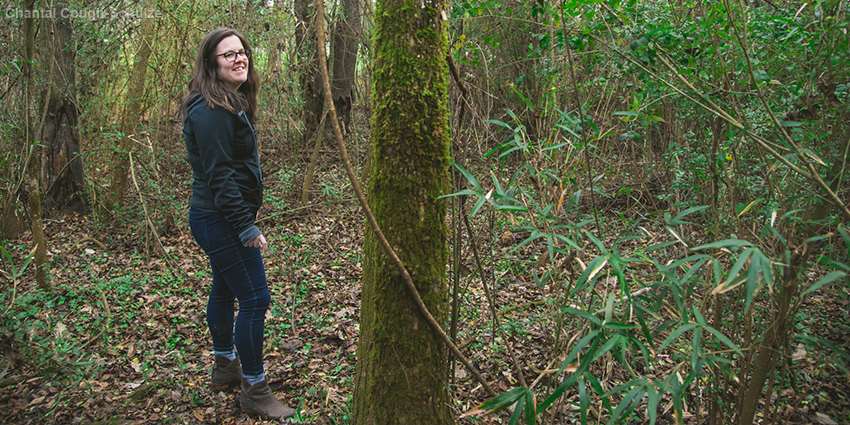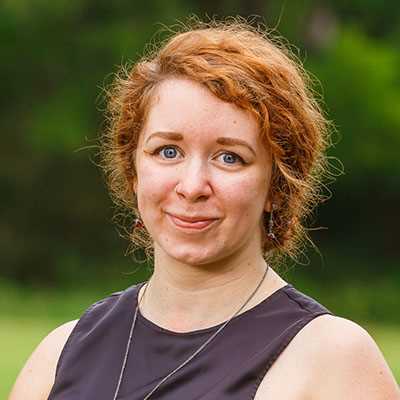Emily Monroe wants to give people access — to the right tools, information and support.
As a Texas A&M AgriLife Extension Service program specialist for the Texas Water Resources Institute (TWRI), Monroe connects the public with what they need, from educational events to septic systems, to accomplish their goals.
Monroe didn’t always want to work in extension — she didn’t even know it existed at first. When she was growing up in Virginia, she would spend hours in the bookstore poring over astronomy magazines, thinking of looking at the world from above as an astronaut. It wasn’t until years later that she learned about the existence of extension, when she moved to Texas to work on her bachelor’s degree in agriculture and environmental science at Abilene Christian University.
“The purpose of extension is to be the bridge between researchers and the producer or government and the producer,” she said. “As soon as I realized that was a job, that was the job I wanted.”
A few years after graduating, Monroe began working for the Norman Borlaug Institute for International Agriculture, where she managed the institute’s Asia portfolio. What she saw in her work for the institute made her want to do similar work at home in Texas.
“I was so inspired by the people that I was working within these different countries, how they cared so much about their communities and knew so much,” she said. “It made me want to come home to Texas and put my knowledge to good use supporting similar work here in my own backyard.”
In October 2018, Monroe joined TWRI, where she is currently managing five projects: the Attoyac Bayou On-Site Sewage Facility Remediation program, the implementation of the watershed protection plans for the Attoyac Bayou and Lavaca River watersheds, the Texas Well Owner Network program and the Healthy Lawns and Healthy Waters program.
In all of Monroe’s work, she said that being present and listening to the public is key. Much of her work revolves around creating educational events and materials that empower Texans to learn about and manage their water quality, often through hands-on activities and lectures.
“At a watershed meeting, a local resident asked, ‘Why can’t we do a workshop out at somebody’s property and see what they’re doing and talk to them about it?’” she said.
Because of that resident’s question, Monroe will be coordinating a "show-and-tell-style" field day where residents can go out and learn from local landowners about the best management practices they implemented and their experiences with them.
“That’s why it’s so important to be active in the communities you’re working in, because you can actually hear what residents want and need,” she said.
Attentiveness to residents’ needs also drives one of Monroe’s other projects, the Attoyac Bayou On-Site Sewage Facility Remediation program. The program provides financial assistance for septic system repair, replacement, or first-time installment for families within the watershed, based on proximity to a waterbody and income level.
“This program has a direct impact on water quality, and it helps those who otherwise might not be able to fix their systems,” she said.
“If we’re removing a straight pipe from a house into the creek, then that’s a pretty big impact on the water quality or the health of the kids playing in their backyards right there.”
By listening to residents and facilitating conversations between residents, scientists and government entities, Monroe can help both the community and the water quality, and she can encourage others to do the same.
“I want to spark interest, build local capacity and help people access information and realize the potential for impact that they have,” she said. “What brings me the most joy is working myself out of a job — local residents get excited and take over, and I move onto the next watershed and start again.”
In the future, Monroe will be building local capacity and addressing agricultural and water issues from even more angles. Since fall 2018, she has been working on her master’s in ecosystem science and management at Texas A&M University. Her thesis, focusing on using remote sensing to map livestock forage quality, will have her looking at the world from above again, just like when she was growing up.
Whether in Texas or elsewhere in the world, she wants to share information and tools that help people do their work and accomplish their goals.
“Everywhere I’ve worked, the culture might be a little different, but overall, producers speak very similar languages across the world,” Monroe said. “They care about feeding their families, caring for their livestock, making sure they have water and doing their jobs well.
“I want to develop useful tools and models that help farmers, ranchers and producers of all kinds manage their property.”
It’s vital, she said, to make those tools accessible.
“We have all this technology, so many satellites, so much information, but if it’s not accessible, that all comes down to — so what?” she said.
“Producers ask, ‘How can I use that? How does that impact me as a producer?’ Those are the questions we need to ask ourselves as scientists and facilitators of science.”
Getting to answer all those questions and connect people with the information, tools and support they need is the point of extension work, Monroe said, so the more questions, the better.
“I’ve wanted to work for extension since I knew it existed. It’s literally our job to make things clear for people. We’re scientists, and we’re doing this research — but TWRI is working for Texans,” she said. “We work for you! So if something isn’t clear, just ask.”


